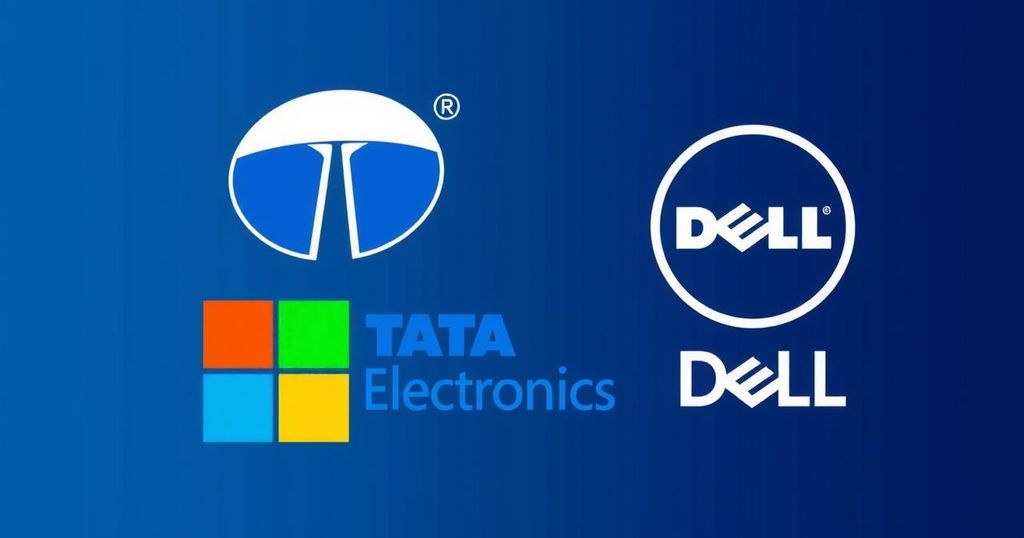Tata Electronics is engaging with major tech firms like Microsoft, Dell, and HP to diversify its client base and establish itself as a significant player in the global electronics manufacturing services market. The company aims to emulate the business model of Foxconn while expanding beyond its current focus on Apple iPhones. Recent challenges, including a factory fire, have prompted this strategic shift to foster growth and explore new sectors such as semiconductors.
Tata Electronics, a prominent participant in India’s electronics manufacturing services (EMS) sector, is currently engaging in discussions with leading technology firms including Microsoft, Dell, and HP. This initiative aims to expand its clientele and establish Tata as a significant player in the global EMS domain. A report by The Economic Times suggests that the company’s objective is to mirror the operational model of Taiwanese contract manufacturing giant Foxconn.
Currently, Tata Electronics has been primarily focused on assembling Apple iPhones; however, they are now seeking to diversify their offerings. An unnamed source indicated that the company’s engagement with Apple has piqued the interest of other significant tech entities. While Tata is in advanced negotiations regarding assembly and component supply with various companies, the outcomes remain uncertain as Tata prefers high-volume contracts.
This strategy of diversification became even more essential following a fire incident at one of Tata’s facilities, which temporarily impeded its growth and scalability. Prabhu Ram, Vice President at Cybermedia Research, highlighted that Tata’s transition from being primarily an Apple-centric supplier towards a more diversified EMS provider reflects its global aspirations. “Engaging with top-tier clients not only diversifies Tata’s revenue streams but also enables it to scale operations and replicate Foxconn’s model,” Ram noted.
For multinational corporations such as Microsoft, Dell, and HP, Tata’s entrance into their supply chains presents a strategic advantage. According to Ram, this inclusion affords these companies diversified sourcing options and mitigates risks associated with reliance on single sources. Neil Shah, Research Vice President at Counterpoint Research, stated, “Tata’s unique advantage is its vertical integration. Unlike Foxconn’s factory-focused model, Tata leverages its group capabilities across software, chip design, and retail.”
Tata Electronics is also contemplating its future within the semiconductor industry. Ekta Mittal, a senior analyst at CCS Insights, remarked that Tata’s ambitions extend beyond mere assembly. The company is examining prospects in high-growth sectors such as semiconductors and sub-components. Mittal emphasized that establishing India as a dependable manufacturing hub is vital for the company’s adaptability and success.
Furthermore, collaborations with major global players are crucial for sustaining Tata’s long-term future. According to Mittal, the Covid-19 pandemic has underscored the necessity of controlling supply chains, particularly for critical components. As Dell and other companies move production away from China, working with Indian manufacturers corresponds with wider trends in global supply chain diversification.
Tata Electronics is actively pursuing opportunities to expand its clientele in the electronics manufacturing services (EMS) market. The company, which has primarily concentrated on Apple iPhone assembly, is now looking to broaden its portfolio by engaging with significant technology firms. This shift is not only driven by market demands but also by Tata’s ambition to establish itself as a leading player in the global EMS landscape, akin to Foxconn. Recent events, including a factory fire, have accelerated this diversification effort.
In conclusion, Tata Electronics is strategically diversifying its client base to include leading firms such as Microsoft, Dell, and HP, moving beyond its existing relationship with Apple. This shift aims to enhance its global competitiveness and revenue streams within the EMS sector. By leveraging its vertical integration capabilities, Tata stands to benefit from reduced supply chain risks while positioning itself for future growth in emerging sectors such as semiconductors. The company’s determination to adapt and collaborate with international partners signifies its commitment to establishing India as a key manufacturing hub.
Original Source: www.business-standard.com

Leave a Reply